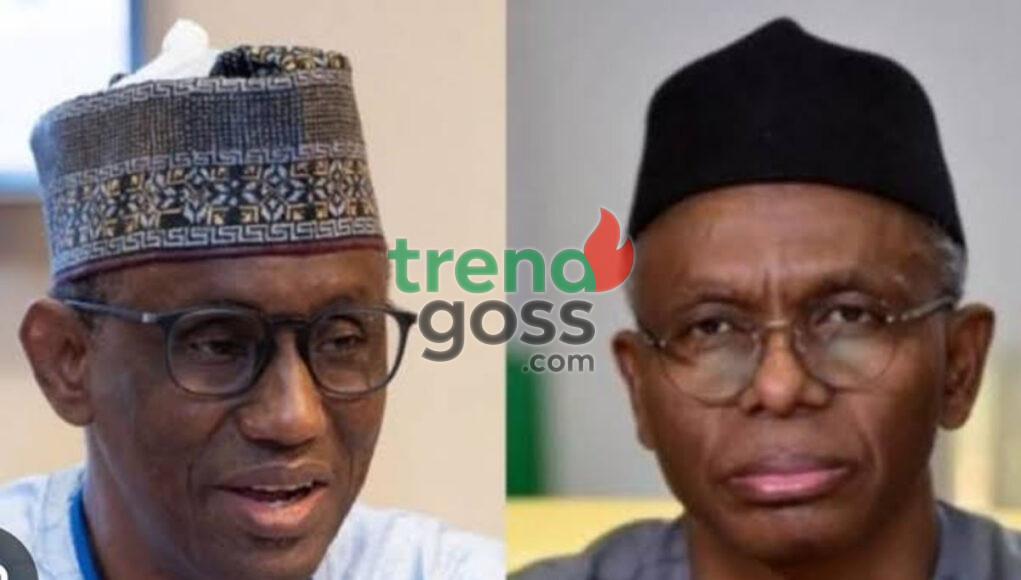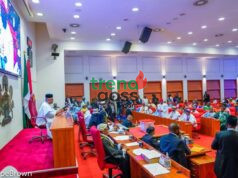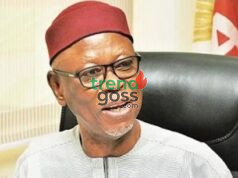All Progressives Congress (APC) chieftain, Farouk Aliyu, has advised the National Security Adviser (NSA), Nuhu Ribadu, to steer clear of the ongoing exchanges between former Kaduna State governor, Nasir El-Rufai, and Labour Party’s 2023 vice-presidential candidate, Datti Baba-Ahmed, over insecurity in the country.
Speaking on Channels Television’s Politics Today on Tuesday, Aliyu said Ribadu should not be drawn into political debates.
“I want to appeal to my brother, Nuhu Ribadu, not to engage with Nasir El-Rufai or Datti Baba-Ahmed. He is above that and should allow others to respond since their discussions are political,” he stated.
The former Minority Leader of the House of Representatives acknowledged insecurity as a national challenge but cautioned against politicising it.
“Yes, there are security challenges, and the government is making efforts to address them. But it is not right for someone in government to contribute to destabilising the same government,” Aliyu added.

Aliyu also criticised El-Rufai’s past remarks about “killing them all,” arguing that such rhetoric was neither realistic nor effective.
“He served as governor for eight years. Tell me, compared to now—two years after his tenure—has insecurity improved? His approach of advocating mass killings did not work. Unfortunately, the current government does not engage in negotiations with terrorists,” Aliyu said.
Insecurity: Baba-Ahmed Blames El-Rufai, APC

Also appearing on the programme, Labour Party’s 2023 vice-presidential candidate, Datti Baba-Ahmed, faulted El-Rufai’s recent claim that the government was making payments to bandits, insisting the former governor could not absolve himself of responsibility.
“El-Rufai cannot distance himself because he was part of it. My concern with his statement is that he has been an integral member of the APC since 2013. As he himself admitted, he was one of the architects of the system.
“Now, suddenly, he wants to absolve himself. No. El-Rufai is part of everything that has been happening. We suffered; we are victims of his misrule in Zaria,” Baba-Ahmed said.
He further urged the National Security Adviser to take El-Rufai’s comments seriously.
“If the office of the NSA treats this statement lightly, then Nuhu Ribadu was never a policeman, he is not a qualified lawyer, and he should not occupy that office,” he stated, adding that El-Rufai should instead be “answering questions before the police and the courts.”
El-Rufai’s Allegation Against FG, Kaduna Govt

The controversy was triggered by El-Rufai’s comments during an appearance on Sunday Politics, where he alleged that both the Federal and Kaduna State governments were “empowering bandits” by providing them with allowances and food under the guise of non-kinetic measures.
“What I will not do is pay bandits, place them on a monthly allowance, or send them food in the name of non-kinetic measures. That is nonsense; it only empowers them,” the former FCT minister said.
Reaffirming his hardline stance, he added: “My position has not changed. The only repentant bandit is a dead one. Kill them all, bomb them until they are reduced to nothing, and then the small percentage that may truly seek rehabilitation can be rehabilitated.”
FG, Kaduna Govts Dismiss Claim
Meanwhile, the Federal Government has rejected El-Rufai’s allegations, describing them as unfounded.
In a statement issued by Zakari Mijinyawa on behalf of the Office of the National Security Adviser (ONSA), the government maintained that “at no time has the ONSA, or any agency under this administration, been involved in ransom payments or inducements to criminals.”
Echoing this position, the Chief of Defence Operations, Major General Emeka Onumajuru, also affirmed that the military does not support paying bandits.

Instead, officials highlighted the existing Disarmament, Demobilisation and Reintegration (DDR) programme under Operation Safe Corridor as the government’s structured approach.
The Kaduna State Government also rejected El-Rufai’s remarks, describing them as “deliberate and malicious falsehoods aimed at undermining security efforts, inciting public anger, and legitimising criminality.”
Commissioner for Internal Security, Suleiman Shuaibu, stressed that the state would not tolerate any attempt to disrupt peace and stability.

However, in a post on his social media platforms, El-Rufai maintained that security agencies were complicit in making payments to criminal groups and accused the Office of the National Security Adviser (ONSA) of politicising national security.
“It is a well-known fact to discerning Nigerians that, for the first time in our recent history, the politicisation of national security for political purposes is being driven from the ONSA under its current leadership,” he wrote.






